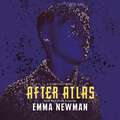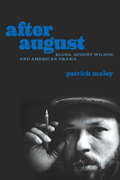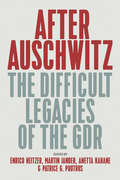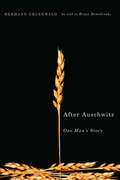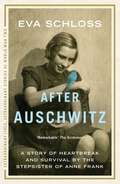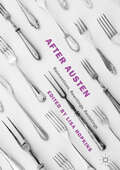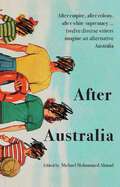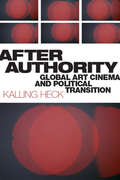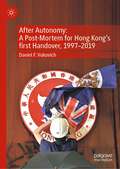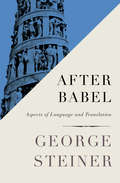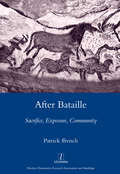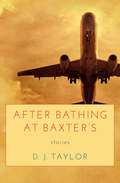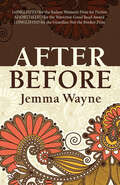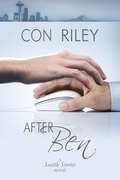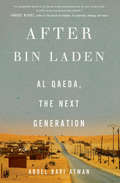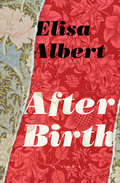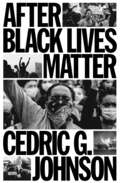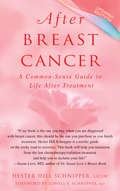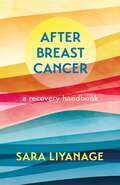- Table View
- List View
After Atlas
by Emma NewmanAcclaimed author Emma Newman returns to the captivating universe she created in Planetfall with a stunning science fiction mystery where one man's murder is much more than it seems... Gov-corp detective Carlos Moreno was only a baby when Atlas left Earth to seek truth among the stars. But in that moment, the course of Carlos's entire life changed. Atlas is what took his mother away; what made his father lose hope; what led Alejandro Casales, leader of the religious cult known as the Circle, to his door. And now, on the eve of the fortieth anniversary of Atlas's departure, it's got something to do why Casales was found dead in his hotel room-and why Carlos is the man in charge of the investigation. To figure out who killed one of the most powerful men on Earth, Carlos is supposed to put aside his personal history. But the deeper he delves into the case, the more he realizes that escaping the past is not so easy. There's more to Casales's death than meets the eye, and something much more sinister to the legacy of Atlas than anyone realizes...Read by Emma Newman(p) Blackstone Audio 2018
After August: Blues, August Wilson, and American Drama
by Patrick MaleyCritics have long suggested that August Wilson, who called blues "the best literature we have as black Americans," appropriated blues music for his plays. After August insists instead that Wilson’s work is direct blues expression. Patrick Maley argues that Wilson was not a dramatist importing blues music into his plays; he was a bluesman, expressing a blues ethos through drama.Reading Wilson’s American Century Cycle alongside the cultural history of blues music, as well as Wilson’s less discussed work—his interviews, the polemic speech "The Ground on Which I Stand," and his memoir play How I Learned What I Learned—Maley shows how Wilson’s plays deploy the blues technique of call-and-response, attempting to initiate a dialogue with his audience about how to be black in America. After August further contends that understanding Wilson as a bluesman demands a reinvestigation of his forebears and successors in American drama, many of whom echo his deep investment in social identity crafting. Wilson’s dramaturgical pursuit of culturally sustainable black identity sheds light on Tennessee Williams’s exploration of oppressive limits on masculine sexuality and Eugene O’Neill’s treatment of psychologically corrosive whiteness. Today, the contemporary African American playwrights Katori Hall and Tarell Alvin McCraney repeat and revise Wilson’s methods, exploring the fraught and fertile terrain of racial, gender, and sexual identity. After August makes a significant contribution to the scholarship on Wilson and his undeniable impact on American drama.
After Augustine
by Brian StockAugustine of Hippo was the most prolific and influential writer on reading between antiquity and the Renaissance, though he left no systematic treatise on the subject. His reluctance to synthesize his views on other important themes such as the sacraments suggests that he would have been skeptical of any attempt to bring his statements on reading into a formal theory. Yet Augustine has remained the point of reference to which all later writers invariably return in their search for the roots of problems concerning reading and interpretation in the West. Using Augustine as the touchstone, Brian Stock considers the evolution of the meditative reader within Western reading practices from classical times to the Renaissance. He looks to the problem of self-knowledge in the reading culture of late antiquity; engages the related question of ethical values and literary experience in the same period; and reconsiders Erich Auerbach's interpretation of ancient literary realism. In subsequent chapters, Stock moves forward to the Middle Ages to explore the attitude of medieval Latin authors toward the genre of autobiography as a model for self-representation and takes up the problem of reading, writing, and the self in Petrarch. He compares the role of the reader in Augustine'sCity of Godand Thomas More'sUtopia, and, in a final important move, reframes the problem of European cultural identity by shifting attention from the continuity and change in spoken language to significant shifts in the practice of spiritual, silent reading in the Middle Ages and Renaissance. A richly rewarding reflection on the history and nature of reading,After Augustinepromises to be a centerpiece of discussions about the discovery of the self through literature.
After Auschwitz: The Difficult Legacies of the GDR
by Enrico Heitzer, Martin Jander, Anetta Kahane Patrice G. PoutrusFrom the moment of its inception, the East German state sought to cast itself as a clean break from the horrors of National Socialism. Nonetheless, the precipitous rise of xenophobic, far-right parties across the present-day German East is only the latest evidence that the GDR’s legacy cannot be understood in isolation from the Nazi era nor the political upheavals of today. This provocative collection reflects on the heretofore ignored or repressed aspects of German mainstream society—including right-wing extremism, anti-Semitism and racism—to call for an ambitious renewal of historical research and political education to place East Germany in its proper historical context.
After Auschwitz: The Difficult Legacies of the GDR
by Enrico Heitzer, Martin Jander, Anetta Kahane Patrice G. PoutrusFrom the moment of its inception, the East German state sought to cast itself as a clean break from the horrors of National Socialism. Nonetheless, the precipitous rise of xenophobic, far-right parties across the present-day German East is only the latest evidence that the GDR’s legacy cannot be understood in isolation from the Nazi era nor the political upheavals of today. This provocative collection reflects on the heretofore ignored or repressed aspects of German mainstream society—including right-wing extremism, anti-Semitism and racism—to call for an ambitious renewal of historical research and political education to place East Germany in its proper historical context.
After Auschwitz
by Hermann Gruenwald Bryan DemchinskyGruenwald paints his life story onto the larger canvas of some of the great conflicts and movements of the twentieth century. He offers a vivid portrayal of growing up affluent and Jewish in class-conscious Hungary in the interwar period and of the initial promise and disillusioning reality of Hungarian communism.
After Auschwitz: A story of heartbreak and survival by the stepsister of Anne Frank (Extraordinary Lives, Extraordinary Stories of World War Two #1)
by Eva SchlossEva was arrested by the Nazis on her fifteenth birthday and sent to Auschwitz. Her survival depended on endless strokes of luck, her own determination and the love and protection of her mother Fritzi, who was deported with her.When Auschwitz was liberated, Eva and Fritzi began the long journey home. They searched desperately for Eva's father and brother, from whom they had been separated. The news came some months later. Tragically, both men had been killed.Before the war, in Amsterdam, Eva had become friendly with a young girl called Anne Frank. Though their fates were very different, Eva's life was set to be entwined with her friend's for ever more, after her mother Fritzi married Anne's father Otto Frank in 1953.This is a searingly honest account of how an ordinary person survived the Holocaust. Eva's memories and descriptions are heartbreakingly clear, her account brings the horror as close as it can possibly be.But this is also an exploration of what happened next, of Eva's struggle to live with herself after the war and to continue the work of her step-father Otto, ensuring that the legacy of Anne Frank is never forgotten.
After Auschwitz: A Story of Heartbreak and Survival by the Stepsister of Anne Frank
by Eva SchlossEva was arrested by the Nazis on her fifteenth birthday and sent to Auschwitz. Her survival depended on endless strokes of luck, her own determination and the love and protection of her mother Fritzi, who was deported with her. When Auschwitz was liberated, Eva and Fritzi began the long journey home. They searched desperately for Eva's father and brother, from whom they had been separated. The news came some months later. Tragically, both men had been killed. Before the war, in Amsterdam, Eva had become friendly with a young girl called Anne Frank. Though their fates were very different, Eva's life was set to be entwined with her friend's for ever more, after her mother Fritzi married Anne's father Otto Frank in 1953. This is a searingly honest account of how an ordinary person survived the Holocaust. Eva's memories and descriptions are heartbreakingly clear, her account brings the horror as close as it can possibly be. But this is also an exploration of what happened next, of Eva's struggle to live with herself after the war and to continue the work of her step-father Otto, ensuring that the legacy of Anne Frank is never forgotten.
After Austen: Reinventions, Rewritings, Revisitings
by Lisa HopkinsThis collection of twelve new essays examines some of what Jane Austen has become in the two hundred years since her death. Some of the chapters explore adaptations or repurposings of her work while others trace her influence on a surprising variety of different kinds of writing, sometimes even when there is no announced or obvious debt to her. In so doing they also inevitably shed light on Austen herself. Austen is often considered romantic and not often considered political, but both those perceptions are challenged her, as is the idea that she is primarily a writer for and about women. Her books are comic and ironic, but they have been reworked and drawn upon in very different genres and styles. Collectively these essays testify to the extraordinary versatility and resonance of Austen’s books.
After Australia: After empire, after colony, after white supremacy ... twelve eclectic writers imagine an alternative Australia
by Michael Mohammed AhmedClimate catastrophe, police brutality, white genocide, totalitarian rule and the erasure of black history provide the backdrop for stories of love, courage and hope. In this unflinching new anthology, twelve of Australia's most daring Indigenous writers and writers of colour provide a glimpse of Australia as we head toward the year 2050. Featuring Ambelin Kwaymullina, Claire G. Coleman, Omar Sakr, Future D. Fidel, Karen Wyld, Khalid Warsame, Kaya Ortiz, Roanna Gonsalves, Sarah Ross, Zoya Patel, Michelle Law and Hannah Donnelly. Edited by Michael Mohammed Ahmad. Original concept by Lena Nahlous. Published by Affirm Press in partnership with Diversity Arts Australia and Sweatshop Literacy Movement.
After Authoritarianism: Transitional Justice and Democratic Stability (Political Economy of Institutions and Decisions)
by Monika NalepaTransitional justice – the act of reckoning with a former authoritarian regime after it has ceased to exist – has direct implications for democratic processes. Mechanisms of transitional justice have the power to influence who decides to go into politics, can shape politicians' behavior while in office, and can affect how politicians delegate policy decisions. However, these mechanisms are not all alike: some, known as transparency mechanisms, uncover authoritarian collaborators who did their work in secret while others, known as purges, fire open collaborators of the old regime. After Authoritarianism analyzes this distinction in order to uncover the contrasting effects these mechanisms have on sustaining and shaping the qualities of democratic processes. Using a highly disaggregated global transitional justice dataset, the book shows that mechanisms of transitional justice are far from being the epilogue of an outgoing authoritarian regime, and instead represent the crucial first chapter in a country's democratic story.
After Authority: Global Art Cinema and Political Transition
by Kalling HeckAfter Authority explores the tendency in art cinema to respond to political transition by turning to ambiguity, a system that ideally stems the reemergence of authoritarian logics in art and elsewhere. By comparing films from Italy, Hungary, South Korea, and the United States, this book contends that the aesthetic tradition of ambiguity in art cinema can be traced to post-authoritarian conditions and that it is in the context of a transition away from authoritarianism where art cinema aesthetics become legible. Art cinema, then, can be seen as a mode of cinematic practice that is at its core political, as its constitutive ambiguity finds its roots in the rejection of centralized and hierarchical configurations of authority. Ultimately, After Authority proposes a history of art cinema predicated on the potentials, possibilities, and politics of ambiguity.
After Autonomy: A Post-Mortem for Hong Kong’s first Handover, 1997–2019
by Daniel F. VukovichThis book offers a sharp, critical analysis of the rise and fall of the 2019 anti-extradition bill movement in Hong Kong, including prior events like Occupy Central and the Mongkok Fishball Revolution, as well as their aftermaths in light of the re-assertion of mainland sovereignty over the SAR. Reading the conflict against the grain of those who would romanticize it or simply condemn it in nationalistic fashion, Vukovich goes beyond mediatized discourse to disentangle its roots in the Basic Law system as well as in the colonial and insufficiently post-colonial contexts and dynamics of Hong Kong. He examines the question of localist identity and its discontents, the problems of nativism, violence, and liberalism, the impossibility of autonomy, and what forms a genuine de-colonization can and might yet take in the city. A concluding chapter examines Hong Kong’s need for state capacity and proper, livelihood development, in the light of the Omicron wave of the Covid pandemic, as the SAR goes forward into a second handover era.
After Babel: Aspects of Language and Translation
by George Steiner&“A brilliant work . . . A dazzling meditation on the very nature of language itself&” from the world-renowned scholar and author of The Poetry of Thought (Kirkus Reviews). In his classic work, literary critic and scholar George Steiner tackles what he considers the Babel &“problem&”: Why, over the course of history, have humans developed thousands of different languages when the social, material, and economic advantages of a single tongue are obvious? Steiner argues that different cultures&’ desires for privacy and exclusivity led to each developing its own language. Translation, he believes, is at the very heart of human communication, and thus at the heart of human nature. From our everyday perception of the world around us, to creativity and the uninhibited imagination, to the often inexplicable poignancy of poetry, we are constantly translating—even from our native language.
After Bataille: Sacrifice, Exposure, Community
by Patrick FfrenchAuthor of the obscene narrative Story of the Eye and of works of heretical philosophy such as Inner Experience, Georges Bataille (1897-1962) is one of the most powerful and secretly influential French thinkers of the last century. His work is driven by a compulsion to communicate an experience which exceeds the limits of communicative exchange, and also constitutes a sustained focus on the nature of this complusion. After Bataille takes this sense of compulsion as its motive and traces it across different figures in Batailles thought, from an obsession with the thematics and the event of sacrifice, through the exposure of being and of the subject, to the necessary relation to others in friendship and in community. In each of these instances After Bataille is distinctive in staging a series of encounters between Bataille, his contemporaries, and critics and theorists who extend or engage with his legacy. It thus offers a vital account of the place of Bataille in contemporary thought.
After Bathing at Baxters: Stories
by D. J. TaylorEighteen tales featuring down-on-their-luck characters whose dreams will never come true, by Man Booker Prize-long-listed author D. J. Taylor In the vein of Raymond Carver's short prose, these eighteen stories sharply capture ordinary people desperate to escape their dead-end lives as they grapple with failure, disappointment, and missed chances. In "Dreams of Leaving," Harlem pornographer Fuchs has seen it all; though he has never traveled farther west than Cincinnati, his bedroom is a shrine to all the places he secretly fantasizes about. "The Summer People" are the tourists who come to Cromer and invade Julian's life every July and August, but this sweltering season of change will mark a turning point in the Norfolk teen's life. In "Flights," a mid-level insurance salesman named Dorfman haunts airports and collects model airplane kits--only to find his humdrum life changed forever by a beautiful Filipino flight attendant. "The Survivor" is about an unsung writer who lives through many millennia, from the Stone Age to the Bronze Age to the present--as well as an unimaginable world without books. And in the title story, twenty-four-year-old deli worker Susy fantasizes about an end-of-summer vacation away from Tara City, Wyoming--"a place you moved out of." Football, a Montana rock band, and a running man populate other tales in this superlative anthology that showcases Taylor's mastery of his craft.
After Before
by Jemma WayneThree women, beset by trauma, temptation, and regret, find each other in this &“rich, haunted, gripping&” novel (Ruth Padel, award-winning author of Beethoven Variations).That was the day that Mama made the rules: If they come, run. Be quiet and run. But not together. Never together. If one is found, at least the other survives… During a cold British winter, three women, each suffering her own demons, reach a crisis point. Emily, an immigrant survivor of the Rwandan genocide, is existing but not living. Vera, a newly Christian Londoner, is striving to live a moral life, her happiness constantly undermined by secrets from her past. Lynn, battling with an untimely disease, is consumed by bitterness and resentment of what she hasn&’t achieved and what has been snatched from her. Their lives have been torn open by betrayal: by other people, by themselves, by life itself. But as their paths interweave, they begin to unravel their beleaguered pasts, and inadvertently change each other&’s futures. Longlisted for the Baileys Women&’s Prize for Fiction
After Ben (Seattle Stories #1)
by Con RileyA Seattle Stories novelA year after the sudden death of his longtime partner, Ben, Theo Anderson is still grieving. The last thing he's looking for is a new lover. But as Theo soon discovers, sometimes life has other plans. While Theo experiences a powerful physical attraction to fellow gym member Peter, it's his new online friend, Morgan, who provides the intellectual challenge to make him come alive. Morgan is witty, brave, and irreverent, and Theo is ready to take the plunge... until he discovers Morgan might be half his age. Theo's late partner was significantly older--enough to strain Theo's relationship with his family--and the potential of another relationship being cut short leaves him gunshy. Theo needs to lay Ben's memory to rest, reconcile with his family, and rekindle neglected friendships if he's to start afresh with a new lover. But Theo isn't the only one with a past. His biggest challenge, in living after Ben, might not be his to face.
After bin Laden: Al Qaeda, the Next Generation
by Abdel Bari AtwanAn &“intelligent and fascinatingly readable&” examination of Al Qaeda after the death of its longtime leader, by the renowned Arab world journalist (Pat Lancaster, editor in chief of Middle East Magazine). Osama bin Laden is dead, yet Al Qaeda remains the CIA&’s number one threat. Since the 9/11 attacks on the United States, and the US military&’s subsequent strikes, the organization has evolved into a much more complex and far-flung entity. This richly documented account of Al Qaeda moves well beyond the headlines to offer readers a deeper understanding of the organization&’s aims, strategies, and fortunes in a new era of conflict with the United States and the Western powers. Drawing on firsthand accounts and interviews with uniquely well-placed sources within Al Qaeda, noted journalist and expert Abdel Bari Atwan investigates the movement&’s new internal dynamics, how it survives financially, and how its political appeal has changed dramatically following the Arab Spring. Atwan profiles the next generation of leaders and explores both the new methods they embrace—especially on the digital battlefield—as well as the global range of their operations and local variations in Somalia, Afghanistan, Pakistan, Libya, Algeria, Tunisia, Morocco, and elsewhere. &“Abdel Bari Atwan has long been one of the sharpest commentators about Al Qaeda and the Middle East.&” —Peter Bergen, author of Manhunt: The Ten-Year Search for Osama bin Laden, from 9/11 to Abottabad &“A sobering, intensive report.&” —Kirkus Reviews
After Birth: A Novel
by Elisa AlbertA fierce novel about the postpartum experience filled with &“dark humor and brutal honesty&” (People). A year has passed since Ari gave birth to Walker, though it went so badly awry she has trouble calling it &“birth&” and she still can&’t locate herself in her altered universe. Amid the strange, disjointed rhythms of her days and nights, and another impending winter in upstate New York, Ari is a tree without roots, struggling to keep her branches aloft. When Mina, a one-time cult indie musician—older, self-contained, alone, and nine months pregnant—moves to town, Ari sees the possibility of a new friend. And despite her unfortunate habit of generally mistrusting other females, they soon become comrades-in-arms . . . With piercing insight about the isolation and unrealistic expectations suffered by new mothers in our society, After Birth is about pregnancy and childbirth that is &“vicious, hilarious, and above all real&” (The New York Times Book Review). &“[A] scaldingly and exhilaratingly honest account of new motherhood, emotional exile, and the complex romance of female friendship.&” —Karen Russell, author of Swamplandia!
After Black Lives Matter
by Cedric JohnsonContemporary policing reflects the turn from welfare to domestic warfare as the chief means of regulating the excluded and oppressedThe historic uprising in the wake of the murder of George Floyd transformed the way we think about race and policing. Why did it achieve so little in the way of substantive reforms? After Black Lives Matter argues that the failure to leave an institutional residue was not simply due to the mercurial and reactive character of the protests. Rather, the core of the movement itself failed to locate the central racial injustice that underpins the crisis of policing: socio-economic inequality.For Johnson, the anti-capitalist and downwardly redistributive politics expressed by different Black Lives Matter elements has too often been drowned out in the flood of black wealth creation, fetishism of Jim Crow black entrepreneurship, corporate diversity initiatives, and a quixotic reparations demand. None of these political tendencies addresses the fundamental problem underlying mass incarceration.That is the turn from welfare to domestic warfare as the chief means of regulating the excluded and oppressed. Johnson sees the way forward in building popular democratic power to advance public works and public goods. Rather than abolishing police, After Black Lives Matter argues for abolishing the conditions of alienation and exploitation contemporary policing exists to manage.
After The Blitzkrieg: The German Army’s Transition To Defeat In The East
by Major Bob E. Willis Jr.The German invasion of the Soviet Union in June 1941 sparked a guerilla resistance unparalleled in modern history in scale and ferocity. In the wake of the initial invasion, the German Army began its struggle to secure a territory encompassing one million square miles and sixty-five million people and to pacify a growing partisan resistance. The German endeavor to secure the occupied areas and suppress the partisan movement in the wake of Operation Barbarossa illustrates the nature of the problem of bridging the gap between rapid, decisive combat operations and "shaping" the post-major conflict environment-securing populations and infrastructure and persuading people to accept the transition from a defeated government to a new one. In this regard, the German experience on the Eastern Front following Operation Barbarossa seems to offer a number of similarities to the U.S. experience in Iraq in the aftermath of OIF. This study highlights what may be some of the enduring qualities about the nature of the transition between decisive battle and political end state-particularly when that end state is regime change. It elaborates on the notion of decisive battle, how the formulation of resistance movements can be explained as complex adaptive systems, the potential of indigenous security forces and the influence of doctrine, cultural appreciation and interagency cooperation on operational-level transition planning.
After Breast Cancer
by Hester Hill Schnipper Lic S W Lowell E. SchnipperAs women quickly discover, their life when treatment ends is very different from what it was before their diagnosis. Often exhausted, anxious, and emotionally volatile, they are beset by physical discomforts, fearful of intimacy, afraid for their children, worried about recurrence. Anticipating a return to “normalcy,” they discover that the old version of normal no longer applies. There could be no more knowledgeable guide for women embarking on this complicated journey than Hester Hill Schnipper, who is herself both an experienced oncology social worker and a breast cancer survivor. This comprehensive handbook provides jargon-free information on the wide range of practical issues women face as they navigate the journey back to health, including: • Managing physical problems such as fatigue, hot flashes, and aches and pains • Handling relationships: your children, your partner, your parents, your friends. • How to regain emotional and sexual intimacy • Coping with financial and workplace issues • Genetic testing: why, whether, when • How to move beyond the fear of recurrence • And much more This indispensable book will help you rediscover your capacity for joy as you move forward into the future—as a survivor.
After Breast Cancer
by Hester Hill SchnipperAs women quickly discover, their life when treatment ends is very different from what it was before their diagnosis. Often exhausted, anxious, and emotionally volatile, they are beset by physical discomforts, fearful of intimacy, afraid for their children, worried about recurrence. Anticipating a return to "normalcy," they discover that the old version of normal no longer applies.There could be no more knowledgeable guide for women embarking on this complicated journey than Hester Hill Schnipper, who is herself both an experienced oncology social worker and a breast cancer survivor. This comprehensive handbook provides jargon-free information on the wide range of practical issues women face as they navigate the journey back to health, including: *Managing physical problems such as fatigue, hot flashes, and aches and pains*Handling relationships: your children, your partner, your parents, your friends.*How to regain emotional and sexual intimacy*Coping with financial and workplace issues*Genetic testing: why, whether, when *How to move beyond the fear of recurrence*And much moreThis indispensable book will help you rediscover your capacity for joy as you move forward into the future--as a survivor.From the Trade Paperback edition.
After Breast Cancer: A Recovery Handbook
by Sara Liyanage'Once treatment stops, and people leave strictly managed clinical environments, survivors feel as though they had "fallen off a cliff edge"... feeling isolated and abandoned at a time when support is needed the most'. - Mental Health Foundation From the final infusion to the five-year check, After Breast Cancer gives a step-by-step support package to coping post-treatment. It follows on from Sara Liyanage's successful coverage of diagnosis and treatment in Ticking Off Breast Cancer, and is driven not only by her experience of illness, but underpinned by contributions from leading oncologists, heads of cancer services, and clinical consultant psychologists. With a readable blend of informality and medically endorsed insight, After Breast Cancer has an optimistic outlook and a reassuring tone, but doesn't flinch from discussing the possibility of secondary cancer, or the full impact of treatment and surgery on you or your loved one. It features a huge amount of practical information, including a full toolkit for navigating the days post-treatment - including breathing exercises, mindfulness meditation, journaling, affirmations and a healthy bedtime routine. Designed for women of all backgrounds, whatever the nature of their diagnosis, this blend of approachability, lived experience and medical insight puts the power firmly back in your hands, as a breast cancer survivor.
